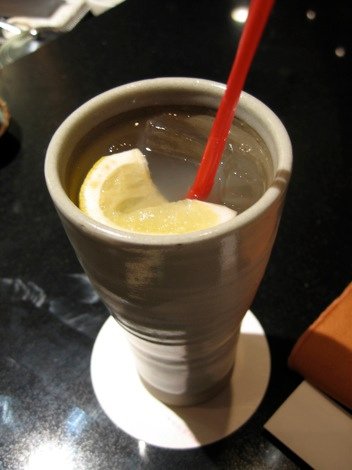
The Perfect Drink to Pair With Chicken Skin

The Perfect Drink to Pair With Chicken Skin
Lemon sour in Tokyo
The lemon sour is ubiquitous on menus in bars and restaurants across Japan. It shouldn’t be mistaken for a sour cocktail like the daiquiri or margarita; the lemon sour (or ramon sawal ‘レモンサワー’) exists in a shining league of its own. A lemon (or grapefruit, or plum) sour is also called chuhai, an abbreviated form of its proper name, Shochu Highball.
I first came across the lemon sour in Tokyo, in a tiny yakitori joint on Omoide Yokocho, Shinjuku’s popular yakitori alley.
The story behind Omoide begins in post-war Japan, when the devastated nation was struggling to find its feet again. Goods were scarce, and staples such as udon and wheat flour for making ramen noodles were strictly controlled, so people remade their businesses according to what was available, such as the entrails of cows and pigs brought by occupation troops. This marked the beginnings of the motsu-yaki shop—which served grilled animal organs—and the stalls soon became prosperous. The shops were (and still are) divided by single boards, huddled close to each other in narrow alleys such as Omoide. The cooks prepare yakitori skewers mere inches in front of you, popping them onto a coal-fired grill when they’re assembled. If you’re lucky (as we were), you get to sit in front of the flames, as the chef deftly cooks the yakitori to a perfect char.
I didn’t know what a lemon sour was, but I ordered it anyway. The drink arrived quickly in a tall glass. The taste was (naturally) slightly sour, yet dry. Made with a base liquor of shochu, the chuhai is mixed with Hi-Sour soda. A slice of lemon is added as a final touch. Some restaurants bring out a squeezer and half a lemon together with your drink so you can squeeze the juice yourself.
The lemon sours at this yakitori stall were weak, but fit perfectly with the food. Paired with motsu—chicken heart, skin, and liver; pork tongue, liver, and intestines—the flavor of the chuhai intensifies the taste of the savory meat. It neither overpowers nor taints, and leaves plenty of room for food, unlike beer.
Light and refreshing, chuhai converted me. I drank nothing else during my visit after that first encounter. Leaving Japan’s shores was difficult, my connection with chuhai severed until my next visit.